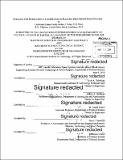Strategy for international cooperation in planning the Chinese Space Station
Author(s)
Foley, Jordan J. (Jordan James)
DownloadFull printable version (30.56Mb)
Other Contributors
Massachusetts Institute of Technology. Department of Political Science.
Advisor
Scott A. Uebelhart, Jeffrey A. Hoffman, and M. Taylor Fravel.
Terms of use
Metadata
Show full item recordAbstract
After ten years of planning and pre-development, the Chinese government approved the space station project on September 25, 2010. In October 2010, the People's Republic of China (PRC) officially announced its independent space station construction project planned for successful completion by 2022 with an operation life of approximately ten years. The Chinese Space Station (CSS) is of particular interest to those who research the country's patterns of behavior in cooperative ventures. The future space station is being advertised as an international collaborative project on an unprecedented scale for China. However, inviting international partners in the process of constructing and operating a space station presents an expansively demanding policy problem. China must determine if there are tangible benefits associated with different scales and scopes of space station cooperation. The key policy issue is finding a model that is effective for fair and rational cooperation based on mutual benefit, transparency, reciprocity, and cost sharing, while striking a balance with partners over ownership, intellectual property, and utilization rights. Through first hand professional and cultural experience in China and translations of various Chinese academic journals, I construct an analytical assessment of PRC space activities and expect CSS to take the form of a regionally focused space station leaving China with ultimate authority over day-to-day operations. Given its past behavior, China will likely control the majority share, establish a chain of command, and be in a position of power rather than establishing a system of equal share. Furthermore, China should extend offers for collaboration to strategic partners in the immediate Asia-Pacific region and beyond while continuing to include the United Nations. I argue that if CSS can be effectively managed as a platform for international cooperation and global leadership, then it can achieve subsidiary benefits for the Chinese government in domestic and foreign policy.
Description
Thesis: S.M. in Technology and Policy, Massachusetts Institute of Technology, Engineering Systems Division, Technology and Policy Program, 2014. Thesis: S.M., Massachusetts Institute of Technology, Department of Political Science, 2014. Original Chinese text of author translations (pages 468- 498). Cataloged from PDF version of thesis. Includes bibliographical references (pages 202-229).
Date issued
2014Department
Massachusetts Institute of Technology. Department of Political Science; Massachusetts Institute of Technology. Engineering Systems Division; Technology and Policy ProgramPublisher
Massachusetts Institute of Technology
Keywords
Engineering Systems Division., Technology and Policy Program., Political Science.